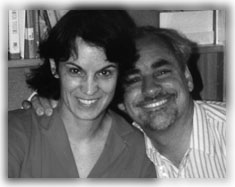Main Menu · Search ·Current Issue ·Contact ·Archives ·Centennial ·Letters to the Editor ·FAQs
Mathematical Translator Barbara Burke Hubbard '69 and John Hamal Hubbard '66 take a break from vector calculus.VEE BURKE
Barbara Burke Hubbard '69 and John Hamal Hubbard '66 take a break from vector calculus.VEE BURKE |
In 1996, former English concentrator Barbara Burke Hubbard '69 became the first non-French author to win the Prix d'Alembert, awarded biennially by the Société Mathématique de France for works that promote understanding of mathematics among the general public. The World According to Wavelets: The Story of a Mathematical Technique in the Making (A.K. Peters), which she wrote first in French, is an introduction to Fourier analysis and to the wavelet transform, a new method of encoding information that cuts across traditional scientific boundaries; voices, fingerprints, and x-rays can all be translated into this "new mathematical language."
Hubbard is also the first Prix d'Alembert winner whose formal study of math ended in eleventh grade. She moved into science writing as a newspaper reporter (earning an AAS-Westinghouse Science Journalism Award for articles on acid rain), and her marriage to John Hamal Hubbard '66, now professor of mathematics at Cornell and the Université de Provence, convinced her "there was more to mathematics" than she had realized in high school. While raising their family on both sides of the Atlantic, she mastered the math needed to write her prizewinning book with help from many of the experts whose research she details.
"Mathematicians claim that math is not a spectator sport: you cannot understand math, or enjoy it, without doing it," she writes, even while acknowledging limits to what someone without the right background can understand. But mathematics "contains ideas that...deserve to be communicated to a wider public," and Hubbard aims to share them, "even if what is communicated is...appreciation, rather than practical knowledge." She also seeks to convey the historical process of mathematical discovery: the Greeks, she writes, "were profoundly troubled by irrational numbers; in the sixteenth century, negative numbers were considered 'impossible' solutions; in the eighteenth century, long division was taught in universities." In so doing, she illuminates the human side of mathematics "generally hidden from outsiders."
With Wavelets well launched--a German edition completed, and a Japanese edition in the works--Hubbard next collaborated with her husband on a calculus text. Vector Calculus, Linear Algebra, and Differential Forms: A Unified Approach (Prentice Hall) has earned praise for its original presentation of material usually taught in separate courses; it is already on order for use at Harvard. The couple are completing a sequel; in the process, Hubbard confesses, she is "finally learning the math one normally would learn before tackling wavelets or Fourier analysis." She is also considering new math-related books for the general public. "When our youngest daughter started studying algebra last year," she reports, "I wrote her an algebraic fairy tale. I'd like to see if I could do something similar on another topic..."
~ Jean Martin